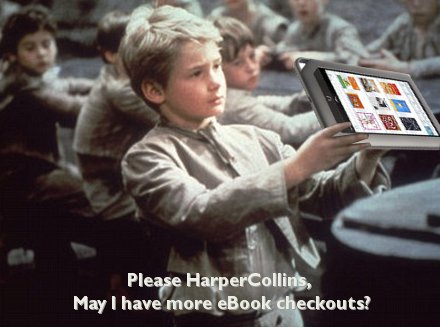What’s going to be more fruitful of our time and efforts in a response to the Harper Collins 26 eBook circ policy change? What will plan of attack will impact our patrons the most and improve their current and future eBook reading for the best?
A boycott of Harper Collins? I’m not so sure. It’s idealistic, feels good, but will it get Simon & Schuster and Macmillan to start offering eBooks to libraries  (who currently don’t allow this at all)? Will it get a new model for all library eBooks created?
I’ve been following #hcod basically since its inception, before the hashtag was even created on Friday. But, I have seen few alternatives (realistic, not idealistic) suggested to the current eBook model other than “DRM is awful”, “eBooks in Overdrive don’t work great right now”, there’s no standard format, and the current model is broken. This is the only one I have seen. Please leave comments if you’ve seen others and I’ll update this post.
Then, there’s the fact that a lot of libraries, especially small public libraries (maybe except those in consortia), can’t afford many eBooks right now. Affording them in the new Harper Collins regime, I don’t think so! Plus, other publishers who will undoubtedly also change their policies to be similar to Harper Collins. So they’ll stop even offering this service at all, and libraries will stop being relevant in the digital age.
What about some of the points from Sarah Houghton-Jan’s AWESOME summary of the situation, Library eBook Revolution, Begin?
What we need is for digital copyright laws to change (libraries need an exemption for digital content, just as we have for physical content). Â We also need legislation introduced that specifies that that libraries, as public lending institutions, are not required to comply with consumer-intended terms of service.
Consumer market eBook vendors like Barnes & Noble and Amazon don’t let publishers get away with the amount of nonsense that we get stuck with through library eBook vendors. I fault the publishers for not realizing what a huge mistake they are making by not realizing that new formats are opportunities–not threats to be quashed. I fault the library eBook vendors for not standing firm and saying “no†to asinine demands. And I fault the library profession for, to date, not standing up for the rights of our users. Our job is to fight for the user, and we have done a poor job of doing that during the digital content surge.
She does suggest boycotting Harper Collins, but after the above statements.
I call on as many libraries as possible to contact HarperCollins (email them at library.ebook@harpercollins.com) and express dissatisfaction.  Beyond that, if have decision-making power at your library I suggest you boycott their content completely–or at least boycott it in digital format.
I call on as many libraries as possible to seriously consider dropping digital content vendors with restrictions and move toward only providing open access titles and formats. Â Yes, that means forgoing most popular titles. Â But you know what? Unless we take a firm stand we will not be heard.
A boycott alone isn’t going to make a huge difference in this situation, I’m afraid. I could be proven wrong, but do boycotts have a high success rate? And even if Harper Collins backs down, we’ll still have the same model we currently live with, maybe without the 26 eBook circ policy. But what if the next publisher tries a similar policy? Will as many people outcry, or will they just slowly accept it as inevitable, because they don’t want to waste energy again on yet another hopeless protest?
What I want to know is where are the Lawrence Lessig types and other recent digital copyright reformers on this topic? Where are the innovative librarians and technologists, like those that developed lendle.me, on this topic? What do authors think about all of this? Do they want to try something different to get their work out to more people, easily? What about voracious eBook readers with the technical know-how for platforms? Do they have any crazy, alternative ideas to the status quo of library eBooks?
For the sake of our patrons and the future of digital eBook access, this situation needs to become much larger than just a simple boycott against Harper Collins. Only then can we even begin to overcome our previous disgruntlement with the status quo of library eBook access.
I’m not trying to be pessimistic here. I don’t support what Harper Collins is doing at all, and I’m going to doggedly be checking the publisher on every book I read for awhile. But I want long-term solutions that will allow eBook lending by our patrons to be easier than ever. Now is the opportunity to come up with a plan. There is a lot of attention on the situation; why can’t we harness the ideas, and try some solutions, so the authors (publishers?) make their money because their writing should receive monetary reward and our library patrons can get as easy access to eBooks as they can to physical books, or maybe even easier? It’s possible. We just have to do it. And we could start by taking this plan, examining it, and making it or something similar work.
Update: I’m seeing the eBook User’s Bill of Rights being passed around this morning. Read it. It’s a start.


